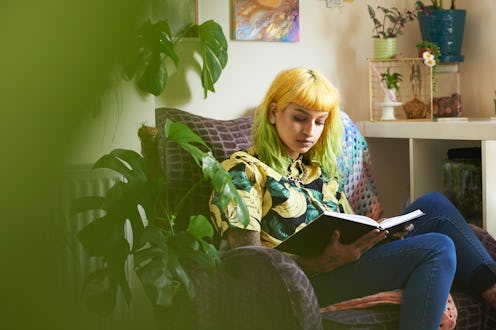
In Solmaz Sharif's debut poetry collection, Look: Poems, the Arizona State professor writes, “All/ those spines lined up on my shelf. How you would stand there, smelling the pages./ them. They all say/ the same story/ and none tell ours.” The volume, a finalist for the 2016 National Book Award, is a favorite of Fatima Farheen Mirza, the New York Times bestselling author of A Place For Us. In honor of Muslim Women's Day on March 27, Mirza joined Bustle editors to share her favorite books — Look being one — by Muslim women. Queue them up, and consider supporting an independent bookstore in the process.
Hard Damage, by Aria Aber is so brave, beautiful, and painfully brilliant. I make sure to keep it nearby and I return to it often. She writes lines that blow you away like, “If, despite relentless blue, despite snow, you dared to hold me/ and I dared to be held.” Look: Poems, by Solmaz Sharif was also huge for me, it was the first time I recognized a life like mine in poetry, with its particularity and perfectly observed details. I was also so grateful for Halal If You Hear Me, a poetry collection edited by Fatimah Asghar and Safia Elhillo, and I’m excited to dive into The Invisible Muslim: Journeys Through Whiteness and Islam, by Medina Tenour Whiteman, a book of personal essays that does the necessary work of interrogating the nuances and complexities of identity and faith. — Fatima Farheen Mirza, author of A Place For Us
The Twenty-Ninth Year, by Hala Alyan is a a book of poetry that hits home for anyone who lives between multiple worlds. Highlighting the cracks that run along her many fractured identities, Alyan's poems inspire readers to relish in both the pain and joy caused by change. Anyone who's ached over who they are, where they belong, or whether they're on a disastrous path will find themselves here. And in Our Women on the Ground: Essays by Arab Women Reporting from the Arab World, writers who cover their homelands highlight the voices of several Muslim women risking their lives from the front lines. The collection shines light on the intimate stories that only women journalists can tell as they navigate violence often covered by white, Western men. "These are our women on the ground," writes the book's editor, Zahra Hankir, "I invite you all to listen to what they have to say. They may surprise you." — Leila Barghouty, Reporter
I Am Malala: The Girl Who Stood Up for Education and Was Shot by the Taliban, by Malala Yousafzai is a story of triumph. This autobiography charts the activist's early life, from growing up during the rise and fall of the Tehrik-i-Taliban Pakistan to the assassination attempt made against her. It's a book I return to when I need strength and to be reminded of why we keep fighting for education for everyone, everywhere. — Samantha Leach, Culture Editor
During my first month covering books for ELLE magazine, I was worried that the professional responsibility would eat away at the escapism of reading. Fortunately, I started with Mirza's A Place For Us. It blew me away, this quiet story of a Muslim family in the Bay Area. As the children grow, the narrative sneaks under bedroom doors, from the protective older sister's to her flailing younger brother's. Together they work to hold each other together, while individually reckoning with American racism. A very different recommendation: Porochista Khakpour's nonfiction work, Sick: A Memoir, in which the New York writer chases and chronicles her chronic pain, searching for its name. For anyone who's felt misunderstood by doctors, Khakpour puts those familiar feelings into words. — Brianna Kovan, Rule Breakers Editor